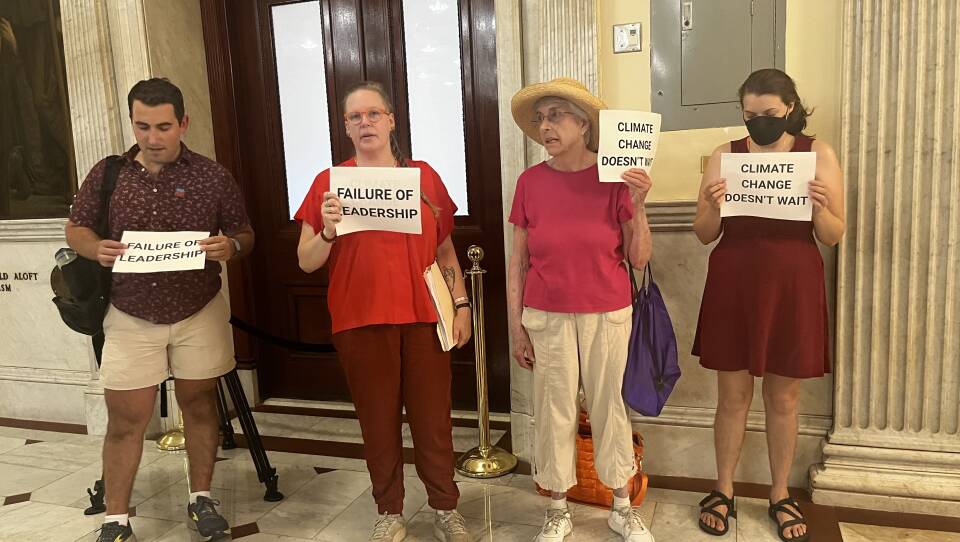Environmental activists in Massachusetts are reacting with frustration at the Legislature’s failure to get a wide-ranging climate bill over the finish line before the end of the legislative session Wednesday night.
Both the Senate and House passed their own versions of a climate bill during the regular session, and they needed to reconcile the differences in order to send a final bill to Gov. Maura Healey. Healey had said a climate bill was a top priority, but because the chambers failed to meet their deadline, she did not get the chance to sign one.
“We have huge support for strong, complete climate action across the state,” said Kirstie Pecci of the waste reduction advocacy group Just Zero.
Pecci said many lawmakers had expressed support for the legislation, making the failure that much more disappointing.
“I can’t tell you how many meetings I had — literally dozens, if not hundreds of meetings — with legislators over the past two years who were enthusiastic about getting something done this session on climate, on plastic, on the bottle bill,” Pecci said. “And to have such an epic fail, it’s just really disappointing knowing that so many folks were so into it.”
Just Zero was among the environmental groups that had especially been pushing for a provision expanding the state’s bottle redemption system, as well as a ban on plastic shopping bags. Those were included as an amendment to the Senate bill , but not by the House.
“Doing something just in one chamber doesn’t accomplish anything,” said Pecci. “So we need our legislators to get more done. Plain and simple.”
In a written statement, Nancy Downes, Massachusetts field campaigns manager for the advocacy group Oceana, criticized the Legislature for failing to curb plastic pollution.
“162 cities and towns throughout the state have passed bans on single-use plastic bags, and statewide polling released by Oceana revealed that nearly 9 in 10 voters in Massachusetts are concerned about single-use plastic and support state and local policies to reduce it,” Downes said in the statement. “Next year, Massachusetts legislators must stop plastic pollution at the source and pass statewide policies to ban unnecessary single-use plastics, including plastic bags and plastic foam foodware.”
Environmental advocates like Steve Long of the Nature Conservancy were looking forward to seeing the House and Senate agree to streamline the process for approving new clean energy projects in Massachusetts.
“It feels like a huge missed opportunity,” Long said. “There was alignment with the Legislature, the administration, diverse stakeholders, and recommendations on siting and permitting that would have made things more equitable and efficient and had better outcomes for nature and people. So I was anticipating, because there was that alignment, that siting and permitting would get approved before the Legislature broke for the summer. So I was unpleasantly surprised.”
There was just too much in the climate bill for the lawmakers to work through, Long said.
“Oftentimes people equate bills to a Christmas tree,” he said. “There were just too many ornaments on this Christmas tree, in addition to siting and permitting. And the there was not enough time to reconcile the differences between the two bills.”
But Long hasn’t given up hope the part of the bill he’s most interested will cross the finish line before the end of the calendar year. The Legislature could break out a standalone bill on clean energy projects and get it passed during informal sessions.
Environmental advocates looking to see the state reduce its reliance on natural gas also voiced their disappointment on Thursday.
“Despite two years of mounting evidence from experts, advocates and officials in the Healey administration sending a clear signal that it’s time to move beyond gas, the House failed to adopt reasonable measures from the Senate to move the Commonwealth off of gas,” Mark Dyen of the group Gas Transition Allies said in a written statement. “Gas companies and their shareholders make an exorbitant amount of money off of replacing methane gas pipes, whether or not these pipes will be useful to residents for five years or 50 years. By allowing gas companies to get away with this massive money-grab, Massachusetts residents will continue to see their bills rise, breathe dirty air, and live with the ever-present threat of dangerous gas leaks.”
The group Mothers Out Front blamed the inaction on gas infrastructure solely on members of the House.
“Massachusetts moms are not willing to compromise on the health and safety of our kids and neither was the Senate,” said Becca Glenn, Massachusetts state manager for the group, in a written statement. “Some things just shouldn’t be negotiable. The real question here is why the House is willing to ask ratepayers to pay billions more dollars for outdated, harmful infrastructure just to placate gas companies.”
“These leaders have had plenty of time to make decisions on environmental priorities. The legislative process is broken and undue influence from corporations routinely blocks popular and effective legislation in favor of utility and developer profits,” said Celia Doremus, executive committee chairperson of the Massachusetts Sierra Club. “This gives me very little confidence that these lawmakers have their constituents’ best interests at heart. It makes it difficult to endorse legislative candidates when we have this type of dysfunction.”





